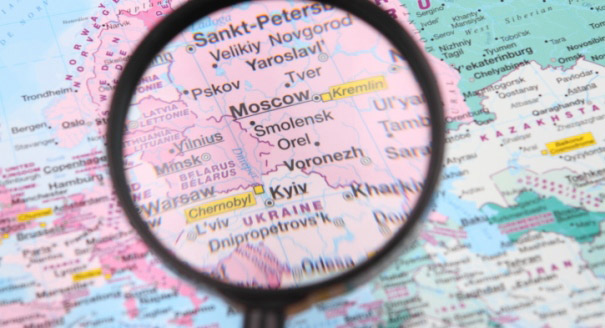The mood among German companies invested in Russia is becoming increasingly pessimistic.
A survey conducted in June by the influential Ost-Ausschuss, or Eastern Committee, showed that over half of the 105 companies questioned expected Russia to slide into recession. The firms, most of which are involved in the manufacturing sector, together have 50,000 employees in Russia and a total turnover there of €20 billion ($27 billion).
These companies also do business in Ukraine, where they employ 17,000 and have a turnover of €3.2 billion ($4.4 billion). Not surprisingly, nearly 80 percent of firms are expecting a recession there.
Take the latest trade figures. New data released by the Ost-Ausschuss and the Federal Office for Statistics show a massive decline in trade between Germany and Russia. For the period from January to April 2014, Germany’s overall trading volume with Russia stood at €24.4 billion ($33.2 billion), down 3.71 percent from the same period in 2013. German exports to Russia fell by nearly 14 percent. In contrast, German-Polish trade is thriving. It jumped by 11.31 percent to €28.0 billion ($38.2 billion).
The figures reflect how much company executives and investors hate unpredictability and instability. Of course, the sanctions imposed by the United States and Europe on Russia in response to Moscow’s meddling in Ukraine also play a role. Only 9 percent of the survey’s respondents favored the measures introduced after Russian President Vladimir Putin annexed Crimea in March. Forty-seven percent said they would accept economic sanctions only as a last resort.
Yet a closer look at the statistics and a comparison with previous quarters show that the decline in German-Russian trade predates the Ukraine crisis. Nearly half of the companies surveyed referred to a general slowdown in economic activity, a quarter said they were having financing problems, and a fifth complained about growing protectionism.
In other words, the Ukraine crisis and Western sanctions are certainly contributing factors, but they are not the cause of this decline, which began two years ago. Under Putin, the country hasn’t been doing well, either politically or economically.
Eckhard Cordes, the chairman of the Ost-Ausschuss, did not hide his concern for Russia’s economic and political direction. “Modernization is not sustainable enough,” he told journalists on June 27 in Berlin. That was putting it mildly.
Cordes told Carnegie Europe that Russia had still to embark on a long-term economic program to diversify the country’s economy and gradually weaken its dependence on energy exports. As it is, gas and oil make up over 70 percent of Russia’s total exports. Some analysts argue that the longer Russia depends on energy, the longer it will take for Russia to become a competitive player in the world economy.
Cordes agreed. He bemoaned how Russia’s dependence on its energy resources was hindering the modernization of its economy, particularly its infrastructure. The country’s transportation network, health system, and environment were all in need of urgent attention. As for investors, they were becoming increasingly frustrated with the deteriorating infrastructure. And the longer the neglect continued, the more investment it would require. “It’s becoming a vicious circle,” he said.
The structural weaknesses of the Russian economy are compounded by a flight of capital. In March 2014, Andrei Klepach, Russia’s deputy economy minister, said that capital amounting to $70 billion would have left the country by the end of the first quarter.
These trends worry and disappoint German company executives involved in Russia. The worry is that without major reforms, without tackling the pervasive corruption, and without reducing the ubiquitous red tape, it will become increasingly difficult to do business in Russia.
The disappointment is that all the immense efforts by successive German governments to support the modernization of the Russian economy have practically come to naught. The Ost-Ausschuss, often criticized for its pro-Russian stance, knows that, too.
This development is bad news not only for German companies but also for Russia’s Western neighbors. A Russia that is stagnating economically and politically risks becoming highly unpredictable, as the Ukraine crisis has confirmed.






.jpg)